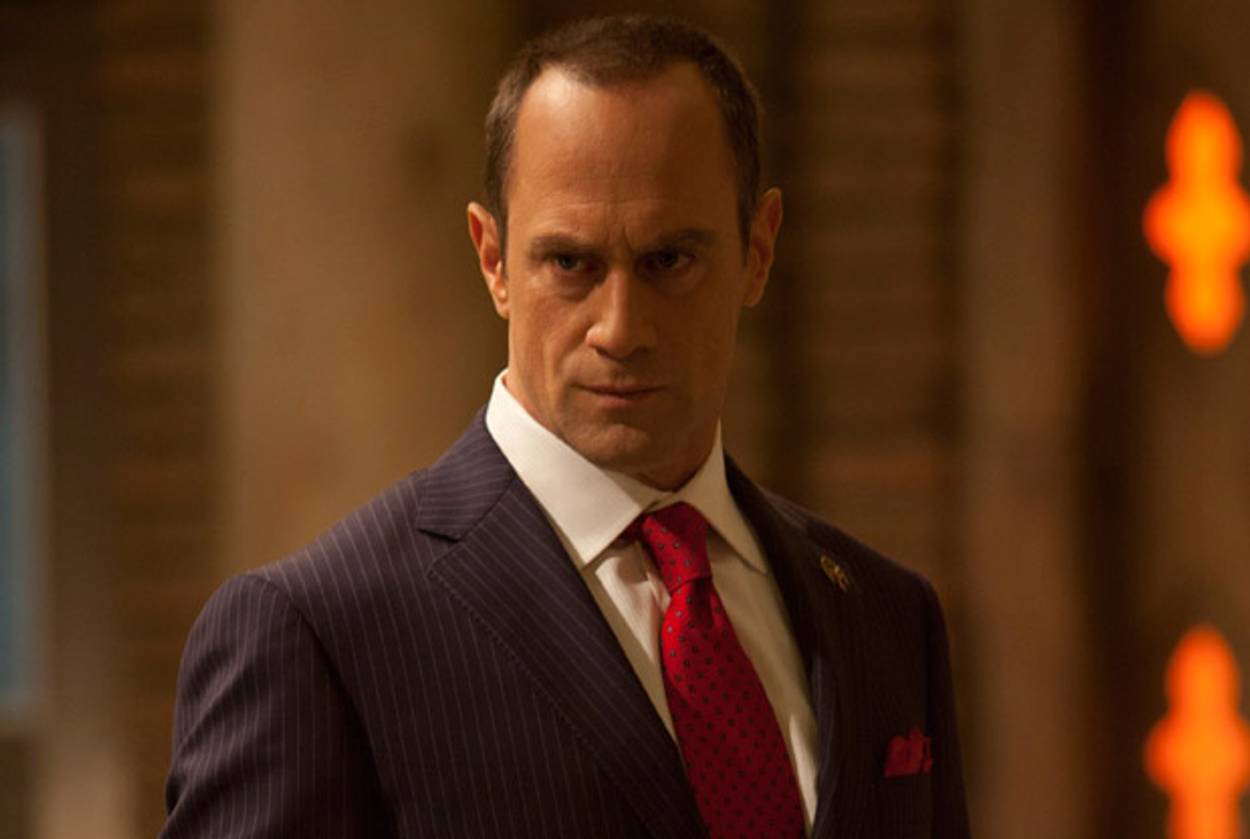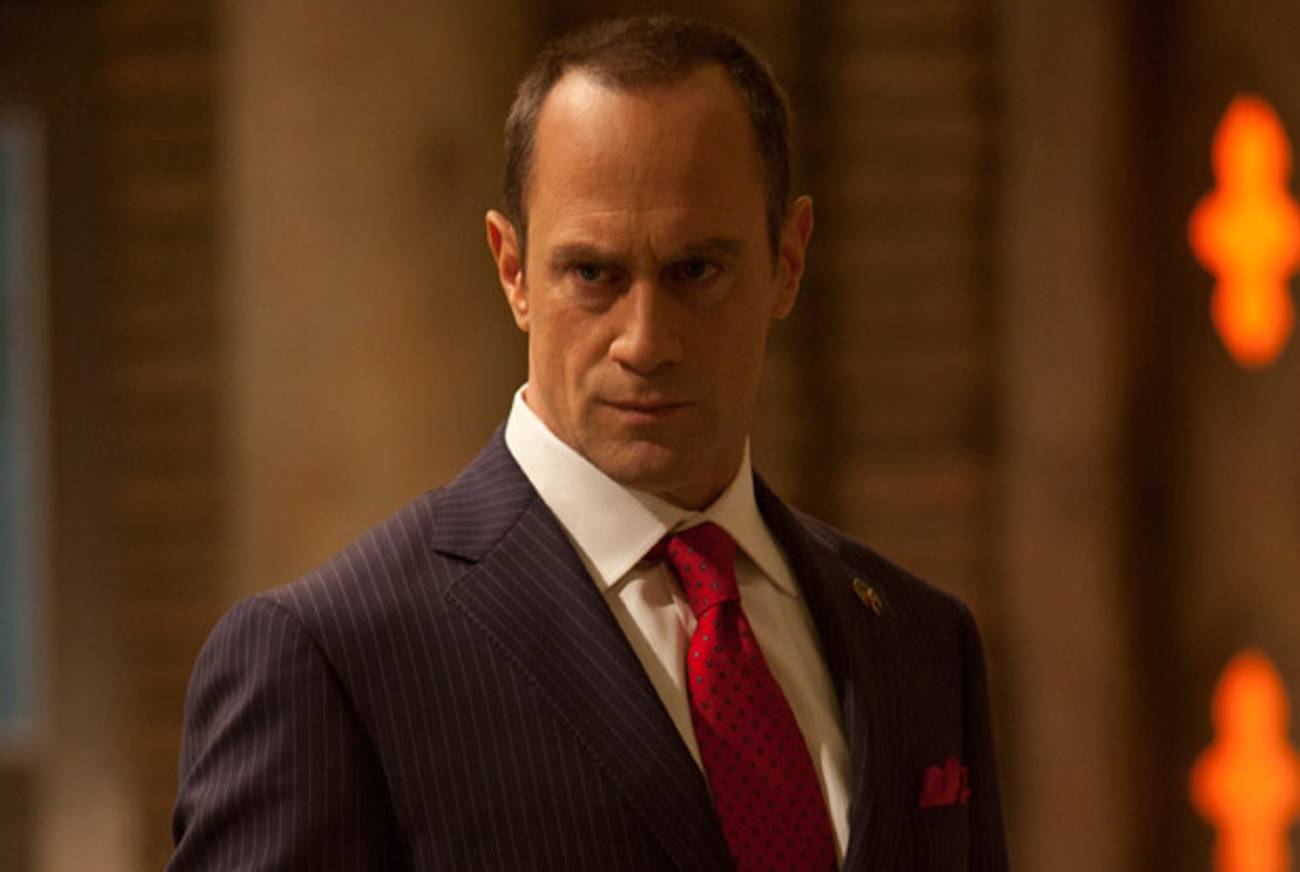HBO’s True Blood Libel
This week, the popular vampire series finally incorporated a Jewish theme—and played into a centuries-old slur




The fifth season of HBO’s vampire-centric series True Blood is now under way. After four years of not touching a Jewish character or Jewish issue with a 10-foot stake, the series finally went there. And it wasn’t pretty.
On Sunday’s episode, we learned of the existence of the Vampire Bible, a text predating the Hebrew Bible in which God (a vampire, of course) created Lilith in his own image and then created Adam and Eve—to be her food. We were then treated to a loony communion scene in which several characters drank blood drawn straight from their spiritual leader’s wrist, while chanting vampire-inflected, bastardized Hebrew.
Vey iz mir, True Blood! Do you have any clue what you’re messing around with here?
The writers of the show surely know that Jews, like vampires, have historically been accused of drinking blood as part of religious rituals. Hearing a Hebrew-spiked prayer in any ritualistic blood-drinking context—let alone one taking place in a room adorned with tablet-shaped panels and kinda-sorta-Jewish-looking eight-pointed stars—made me wince, an indication that even today, the potency of the term “blood libel” persists. Pair the blood-drinking action with a scene in which a cabal of sinister rulers prays, using recognizable Hebrew words, to “Lord and Lilith, father and mother,” and swear fealty “to the blood and the progenitor,” and well, my hackles rise.
What makes this especially disturbing is that this is the first time the show has shown any interest in Jewish culture. Until now, the vampires on True Blood have been a not-very-metaphorically-stretchy metaphor for gay people. But of course, Jews are outsiders, too. Anxiety about blood is one reason straight people have feared gay people; Jews, too, are associated with an unnerving mythology about blood—in an even more literal parallel than that of gay men. Furthermore, vampires are repelled by crosses and holy water, two things that uneducated peasants might assume would also repel Jews. So, suddenly seeing symbology that’s historically been used to oppress Jews repurposed by unsympathetic characters in a way clearly meant to invoke the idea of blood libel is more than a little unnerving. And yes, culturally insensitive.
It’s a wasted opportunity, too. One issue the show keeps wrestling with, an issue that feels particularly resonant after Sunday’s episode, is acculturation. This week, we met a new character, Roman, the head of the Vampire Authority (a sort of rabbinic vampire council) played by Chris Meloni (of Law & Vampire). Roman declared, “Coexistence with humans is not an option … it is a necessity.” Meanwhile, we get all this creepy semi-Hebrew—thanks to on-screen translations, we know that breishita means first, tamid means eternal, and abba v’ima means father and mother, for instance—and all that blood-drippy sippy ritual. Even as Roman talks about coexistence, he’s depicted drinking blood and praying to a baby-strangling Jewish succubus demon, all of which made me question just how successful our own acculturation has been.
Like vampires, we Jews have been the dark, feared people trying to “pass” in a wider culture that considers us both attractive (we make money! we are smart!) and repellent. Like vampires, we’ve been perceived as a sexual threat. We, too, have been viewed as leeches and parasites, sometimes metaphorically (as in charges of usury), but other times quite literally: Romanian psychologist Peter Dan points out that “Karl Lueger, the mayor of Vienna from 1897 to 1910, a man Hitler called ‘an inspiration,’ referred to the Jews as ‘Blutsauger’—a word meaning ‘bloodsucker’ or ‘vampire.’ ” And now here’s Chris Meloni invoking abba v’ima while dripping blood into the evil mouths of the faithful. Plus ça change.
The questions True Blood constantly raises about assimilation vs. clannishness are of course relevant to us. Roman’s line about the necessity of coexistence recalls how the Jewish community today is riven between those who want to acculturate and those who urge separatism. How desirable is passing? One vampire, the deliciously crazed, bloodthirsty Russell Edgington (played with scenery-chomping gusto by Denis O’Hare), has rejected vampire-human multicultural outreach entirely. Russell popped up on a newscast a couple of seasons ago to rip out the heart of an anchorman and destroy the carefully crafted message of vampires! they’re just like us! fostered by the American Vampire League, a P.R. organization for vampires. With his face covered in blood and viscera, Russell snarled, “We are nothing like you. We are immortal! Why would we seek equal rights? You are not our equals! We will eat you after we eat your children! Now, time for the weather. Tiffany?”
Unlike Russell, some vampires on the show are menschy. Bill, a basically sympathetic character, desperately seeks “mainstreaming,” prefers consensual, monogamous bloodsucking, and is nice to old people. He wants to step into the (figurative) light. But now Bill and the (naughtier but still sympathetic) hot Nordic blond vampire Eric have fallen into the clutches of the evil Hebrew-ishly-chanting, blood-ritual-doing vampires who preach integration into majority culture while doing unholy cultish Jew-y things in private, and well, this feels Bad for the Jews.
The premise of the show is that vampires could finally come out of the coffin once the Japanese developed a synthetic blood substitute. Unfortunately, in real life, we Jews lacked such a simple, clear signal that it was safe to come out as Jews. One could argue that the lesson of Jewish history, much like that of a horror movie, is that once you think the danger’s past, something horrible leaps out of the dark. Unintentionally, perhaps, invoking blood libel and Hebrew prayer is a reminder that we’re more Other than some of us would like to think.
***
Of course, I realize that this is a campy TV show. But I wonder whether part of the problem is how relentlessly goyish this show has always been. If there had been any Jewish characters (uh, ever, in five seasons) to counter the portrayal we saw this week, it might feel less opportunistically creepy. I know that the fictional, swampy town of Bon Temps, La., where the show is set, is unlikely to have a shul. But the vampire bar Fangtasia is in nearby Shreveport, a real live place with real live Jews. Shreveport has had three Jewish mayors! (I read it on Wikipedia.) And Fangtasia is a very popular vampire bar, so you’d think it would have a Jewish accountant. Or a Jewish lawyer, what with all the people getting their blood drained in the parking lot and beaten up by “God hates fangs” protesters outside.
But not only has this show not had any Jewish characters, it’s barely had any Jewish actors. Only two major characters were portrayed by Jews: Lizzy Caplan played Amy, Jason Stackhouse’s privileged, slumming, vampire-blood-addicted girlfriend, and Evan Rachel Wood played Sophie-Anne, the crazy-eyed Vampire Queen of Louisiana. But those characters are dead, and guess what: While there have been 169 actors who have appeared in the credits of this show (I’m nearly as good with IMDb as I am with Wikipedia), only a handful—Lauren Weedman, Andrew Rothenberg, Dahlia Weingort—have names that suggest they might be members of the tribe. Star Trek had more Jews, and it was set in outer space.
There was even a joke about the show’s goyishness in the first episode of this season. When hot Nordic blond vampire Eric got his emergency fake-ID papers (if you’re not a watcher of this show, just go with it), he discovered that his new name was Ike Applebaum. This Jewish-sounding name prompted him to raise his eyebrow sardonically. Oh, ho ho. When hot Nordic blond vampire Eric was promptly captured by the Vampire Authority, it became clear that there would be no “Ike Applebaum, Vampire CPA” plotline. But what if there had been? What if the show were to explore, sympathetically, the inner lives of the Jewish undead?
It’s a shame the show had to other-ify us so harshly on Sunday when it could have drawn a far more sympathetic (and nuanced, and interesting) parallel between Jews and vampires. You know, more like the one it’s been drawing between vampires and gays for five seasons. Maybe it’s time to add a non-caricatured, non-cartoonishly evil Jewish character to the mix. Maybe a confused Chabadnik who comes to Bon Temps to recruit and discovers that he’s a shapeshifter? Or a tortured Golem yearning for a father, brought forth from the boggy soil of the bayou? I’m not saying the show has to treat Jews seriously—not when it’s teeming with over-the-top portrayals of Maenads, werewolves, witches, fairies, and brujos. But maybe in the future it can avoid invoking real hatred and misunderstanding that caused the deaths of so many actual people and treat us with the same kind of non-invisibility with which it treats its non-humans.
***
Like this article? Sign up for our Daily Digest to get Tablet Magazine’s new content in your inbox each morning.
Marjorie Ingall is a columnist for Tablet Magazine, and author of Mamaleh Knows Best: What Jewish Mothers Do to Raise Successful, Creative, Empathetic, Independent Children.
Marjorie Ingall is a former columnist for Tablet, the author of Mamaleh Knows Best, and a frequent contributor to the New York Times Book Review.